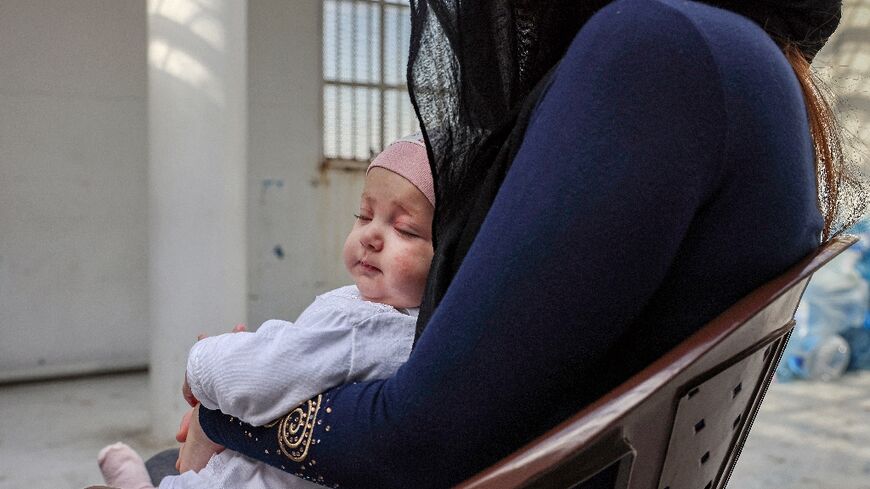As war in Gaza drags on, crucial female hygiene products run out
Women in Gaza are particularly affected by the lack of humanitarian aid, with difficulties finding essential goods like feminine hygiene products.

After more than 10 months of war and repeated displacement, women in the Gaza Strip say that tending to their personal hygiene has become difficult. Since the war began in October, goods such as menstrual hygiene products and razors have become very expensive if they can be found at all.
There are over 540,000 women and girls in Gaza of reproductive age who require access to essential hygiene and health care supplies, according to a July report by Care International, a global humanitarian agency providing aid to poverty-stricken populations with a particular focus on women.
Leena Abu Hain, 21, who is currently staying in a tent in Deir al-Balah in central Gaza after being displaced several times since she left her home in Gaza City at the start of the war, says that she has to spend a lot of money and time to stay clean.
“I can find some sanitary pads and shampoos in the market, but they are of a very low quality and crazy prices,” she told Al-Monitor.
Abu Hain complained about using a shared hole in the ground for a toilet inside a tent that she shares with several other families. “There is no privacy at all. I feel very embarrassed to walk into this tent, and I hide my personal belongings every time I go there, and still feel overwhelmed every time I have to do this.”
UN Women has described the current war on Gaza as a “war on women." Speaking to reporters in Jerusalem following her visit to Gaza last month, the agency’s special representative in Palestine, Maryse Guimond, said that war takes a particularly heavy toll on women and girls. "Wars are never gender-neutral but no doubt, in Gaza, one million women and young girls are bearing the worst brunt of nine months of war," she said.
"Nearly 1 million women and girls have been displaced five, seven times, moving to areas that are increasingly smaller and where they are targets of attacks and bombing," she added.
Abu Hain says that women in her area want to shower daily because of the heat in the tents where they are staying, but often water is not available. Many women have to walk several miles to get it.
“I am lucky to be able to shower every day, but I don’t use shampoo every day because it’s very expensive. Also, I don’t have a bar of soap or shower gel,” Abu Hain told Al-Monitor via phone.
Oxfam said last month that the Israeli government has systematically used water as a weapon against Palestinians throughout the war, raising serious concerns about human rights violations and breaches of international law.
Samaher Kishko, a 39-year-old pregnant woman who has remained in her home in northern Gaza despite the heavy fighting, says that access to both healthy food and prenatal medical care is extremely limited.
“I visit a private clinic nearby to check on my baby. I was told that the child is not growing as it should, but I eat whatever is available, which is mostly bread and dates,” she told Al-Monitor.
Kishko says she has to buy supplements to give her baby the nutrition it needs and that she can’t afford to buy eggs and meat as they are expensive. “I ate eggs weeks ago. We bought five eggs for 50 shekels [$13.45]. This is a crazy price that I cannot afford."
Before the Israeli military operation began in Rafah last May, women recounted they would sometimes receive sanitary pads in the humanitarian handouts. But since then, humanitarian aid has become more irregular.
No clothes have entered Gaza since the beginning of the war. Women are wearing what they already had, or the few sets of clothes they brought with them when they evacuated from the north to the south. New underwear is not available, except for some made locally of low-quality materials.
Riham, 27, who is currently staying in a tent in the designated humanitarian area of Al-Mawasi in Khan Younis in southern Gaza, says she has to pay a lot for deodorant, laundry detergent and menstrual products.
“I know a lot of my friends who use bits of clothes or baby diapers during their periods. Sanitary pads are three times more expensive as before the war, and panty liners disappeared in the first weeks,” she told Al-Monitor.
Riham buys homemade shampoo and laundry detergents that are both expensive and low quality.
“Even cleaning the few sets of clothes we have is very hard. We need new clothes and underwear,” she said.
Riham can’t find many of the products she used to buy before the war and now has to pay more than 100 Israeli shekels ($27) for a single bottle of shampoo, which she rations.
Women in Gaza don't know when these products will disappear from the market entirely.
“I have to always look for these items and keep some with me. This is an additional burden for me besides taking care of my and my child’s safety,” Riham said.








